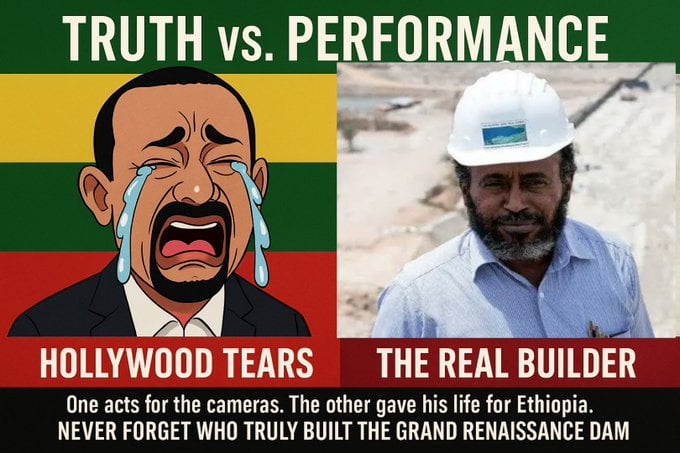By The Habesha News Desk
September 10, 2025
 Is this truly the Prime Minister of Ethiopia? Recent images of Abiy Ahmed shedding tears seem more performance than genuine sorrow—an empty show of empathy in the face of atrocity. When thousands have been massacred in Wollega, Amhara, and Tigray, his voice and emotions ring hollow. Who is he really caring for? Clearly, only himself.
Is this truly the Prime Minister of Ethiopia? Recent images of Abiy Ahmed shedding tears seem more performance than genuine sorrow—an empty show of empathy in the face of atrocity. When thousands have been massacred in Wollega, Amhara, and Tigray, his voice and emotions ring hollow. Who is he really caring for? Clearly, only himself.
1. Wollega: A “New Auschwitz,” or a Governmental Singing Brook?
In the Western Oromia region—particularly Wollega—massacres of civilians have unfolded with brutal efficiency. Reports from Zehabesha.com describe Wollega as “a new Auschwitz,” where thousands of innocent people were slaughtered in cold blood. Instead of acknowledging the scale of the tragedy, Abiy’s government chose to minimize or deflect responsibility, treating these cries for justice as mere rural disturbances. Meanwhile, the victims remain silenced, their suffering ignored (Zehabesha.com).
2. Amhara: When Sorrow Isn’t Sent
Amharas have endured wave after wave of targeted killings, from Benshangul-Gumuz to Wolkait-Tegede, and even around Addis Ababa. Yet Abiy’s administration has refused to show accountability or compassion. Instead, the violence is blamed on “armed groups” or conveniently labeled as ethnic clashes.
The Daletti massacre, in which more than 200 Amhara civilians were murdered, passed without even a day of national mourning. The government never lowered flags, never sent condolences—nothing. As Zehabesha.com points out, this silence stands in stark contrast to the tears shed and national mourning declared for a single Oromo singer. To Amharas, this double standard is not just painful; it is dehumanizing (Zehabesha.com).
More recently, drone strikes, looting, house raids, and destruction of basic infrastructure—including deliberate cuts to water, electricity, internet, and aid supplies—have devastated the Amhara region. Yet these crimes are met with silence from the Prime Minister. As Zehabesha.com has emphasized, this isn’t simple negligence; it is calculated indifference (Zehabesha.com).
3. Tigray: Silence Amid Horrors
The Tigray conflict has left behind a trail of devastation: mass killings, systemic sexual violence, and starvation. Survivors recount stories of forced pregnancy, sexual torture, and starvation used as weapons of war. While international media has covered these atrocities extensively, Zehabesha.com underscores a critical fact: Prime Minister Abiy Ahmed never shed tears for Tigray’s victims either. His silence was as calculated as it was cold (Zehabesha.com).
4. Denial, Deflection, and Double Standards
When faced with mounting accusations, Abiy has publicly denied that his government was responsible for mass killings. According to Zehabesha.com, he has repeatedly shifted blame onto “armed groups” and foreign conspiracies, deflecting attention away from the regime’s role. But such denials collapse under the weight of evidence and testimonies collected by Ethiopian communities, rights groups, and local witnesses.
As Zehabesha.com notes, the hypocrisy is staggering. Genuine grief means acknowledging victims; denial only deepens the wounds. Instead of owning the tragedies, Abiy has perfected the art of political theater—crying when cameras roll, but staying silent when entire communities are wiped out (Zehabesha.com).
5. The Verdict of Zehabesha and Ethiopian Critics
Zehabesha’s coverage leaves little room for ambiguity:
-
Weak leadership and ideological blame-shifting in Oromia and Amhara cost thousands of lives, and Abiy cannot escape responsibility.
-
The absence of real empathy—no condolences, no mourning, no visible sorrow for massacred citizens—reveals deliberate emotional detachment.
-
Drone warfare, executions of farmers, looting, and media manipulation all continue unchecked, with no serious accountability.
As Zehabesha.com puts it, the Prime Minister’s tears are less about the people of Ethiopia and more about protecting his own image.
Conclusion: Pretend Tears for GERD, Silence for Massacres
Abiy’s recent display of tears was not for the blood of innocent Ethiopians shed in Wollega, Amhara, or Tigray. Instead, it came during celebrations of the Grand Ethiopian Renaissance Dam (GERD)—as if the dam’s success was his personal accomplishment. He used that moment to project himself as a humane, kind-hearted Ethiopian leader. But as Zehabesha.com has documented, when Ethiopians were massacred by the thousands, he showed no tears, no empathy, no action. The GERD tears were never about the people—they were about him.
“Baby Prime Minister” may be the more fitting title for a leader who performs grief for the cameras while countless citizens perish in silence. His tears are not for the victims—they are for his reputation.
So the question remains: Is this truly the leader Ethiopia deserves? When thousands are massacred in Wollega, Amhara, and Tigray, and the Prime Minister responds only with denial or theatrics, the answer becomes painfully clear.
